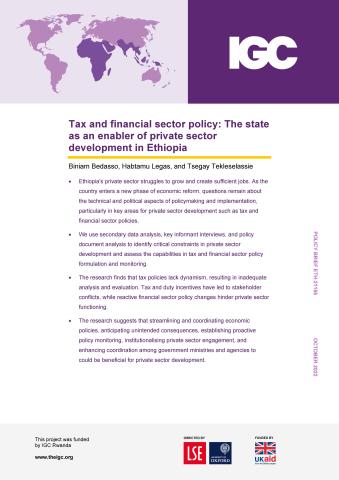Tax and financial sector policy: The state as an enabler of private sector development in Ethiopia
Ethiopia's private sector faces growth challenges and uncertainties. This policy brief investigates critical constraints in private sector development and assesses the capabilities in tax and financial sector policy formulation and monitoring.
-
Bedasso et al Policy brief October 2022
PDF document • 349.17 KB
- Ethiopia's private sector struggles to grow and create sufficient jobs. As the country enters a new phase of economic reform, questions remain about the technical and political aspects of policymaking and implementation, particularly in key areas for private sector development such as tax and financial sector policies.
- We use secondary data analysis, key informant interviews, and policy document analysis to identify critical constraints in private sector development and assess the capabilities in tax and financial sector policy formulation and monitoring.
- The research finds that tax policies lack dynamism, resulting in inadequate analysis and evaluation. Tax and duty incentives have led to stakeholder conflicts, while reactive financial sector policy changes hinder private sector functioning.
- Research suggests that streamlining and coordinating economic policies, anticipating unintended consequences, establishing proactive policy monitoring, institutionalising private sector engagement, and enhancing coordination among government ministries and agencies to could be beneficial to private sector development.




